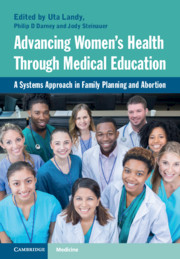 Advancing Women's Health Through Medical Education
Advancing Women's Health Through Medical Education Book contents
- Advancing Women’s Health Through Medical Education
- Reviews
- Advancing Women’s Health Through Medical Education
- Copyright page
- Dedication
- Contents
- Contributors
- Preface
- Acknowledgments
- Introduction
- Section I Abortion Training: Workforce, Leadership, Social & Political Impact
- Chapter 1 A Systems Approach to Medical Education
- Chapter 2 Training in Contraception and Abortion to Reduce Maternal Mortality
- Chapter 3 The History of Integrated Training in Abortion and Contraception for Obstetrician-Gynecologists in the USA
- Chapter 4 The Medical Community, Abortion and the Crucial Role of Physician Advocacy
- Chapter 5 The US Fellowship in Family Planning as a Community of Practice
- Chapter 6 Building Evidence through Research
- Chapter 7 Impact of Integrated Family Planning Training
- Chapter 8 Conscientious Provision and Objection in Medical Training in the Context of the Abortion Controversy
- Section II Integration of Abortion into Graduate Medical Education
- Section III Family Planning Curricular Design & Implementation
- Section IV Reproductive Health Services & Abortion Training: Global Examples
- Index
- References
Chapter 1 - A Systems Approach to Medical Education
from Section I - Abortion Training: Workforce, Leadership, Social & Political Impact
Published online by Cambridge University Press: 30 July 2021
- Advancing Women’s Health Through Medical Education
- Reviews
- Advancing Women’s Health Through Medical Education
- Copyright page
- Dedication
- Contents
- Contributors
- Preface
- Acknowledgments
- Introduction
- Section I Abortion Training: Workforce, Leadership, Social & Political Impact
- Chapter 1 A Systems Approach to Medical Education
- Chapter 2 Training in Contraception and Abortion to Reduce Maternal Mortality
- Chapter 3 The History of Integrated Training in Abortion and Contraception for Obstetrician-Gynecologists in the USA
- Chapter 4 The Medical Community, Abortion and the Crucial Role of Physician Advocacy
- Chapter 5 The US Fellowship in Family Planning as a Community of Practice
- Chapter 6 Building Evidence through Research
- Chapter 7 Impact of Integrated Family Planning Training
- Chapter 8 Conscientious Provision and Objection in Medical Training in the Context of the Abortion Controversy
- Section II Integration of Abortion into Graduate Medical Education
- Section III Family Planning Curricular Design & Implementation
- Section IV Reproductive Health Services & Abortion Training: Global Examples
- Index
- References
Summary
The first reforms in health education occurred in response to the publication of the Flexner Report in 1910, more than a hundred years ago [1]. The reforms, sparked by the discovery of the germ theory in Europe and other scientific advances, led to the integration of early developments in medical science into the academic education of physicians. Ten years ago, the Lancet published a report, “Health Professionals for a New Century: Transforming Education to Strengthen Health Systems in an Interdependent World,” based on the findings of a global independent commission to address the inequities in health, despite enormous scientific advances in medicine [2]. In this report, twenty professional and academic leaders representing the perspective of diverse countries defined an educational strategy for medicine, nursing and public health. Its intention was to consider the relationship between health systems and education and recommend strategies to produce a workforce that addresses the health needs of a particular country.
- Type
- Chapter
- Information
- Advancing Women's Health Through Medical EducationA Systems Approach in Family Planning and Abortion, pp. 7 - 20Publisher: Cambridge University PressPrint publication year: 2021
